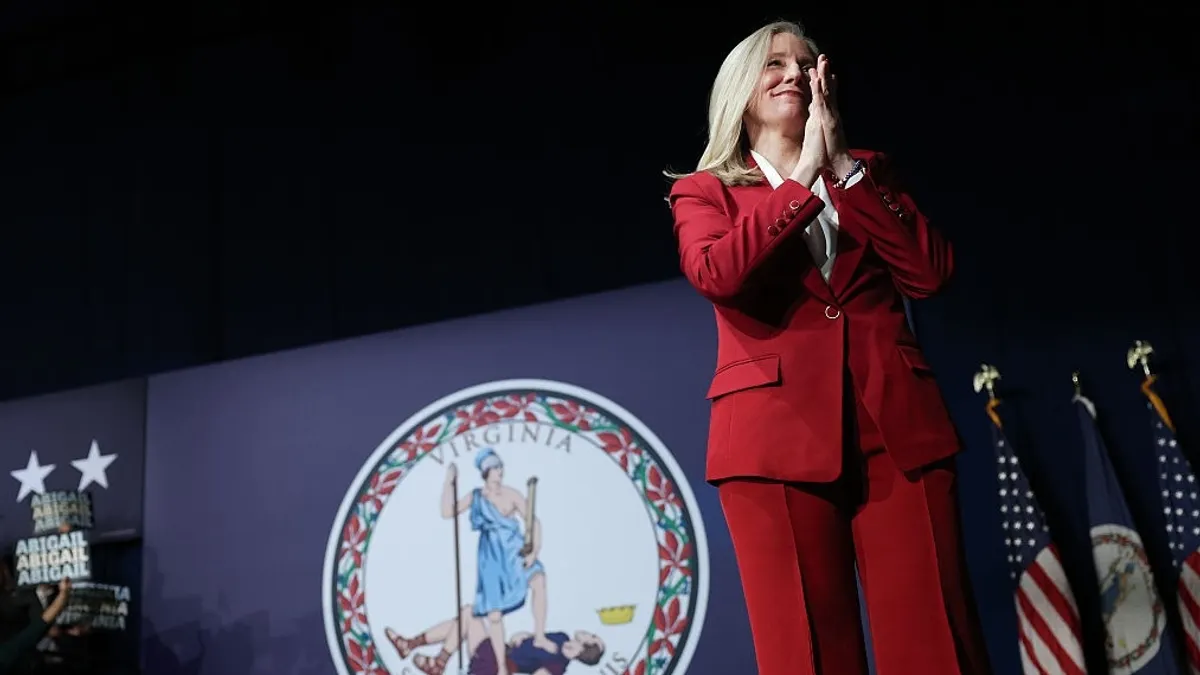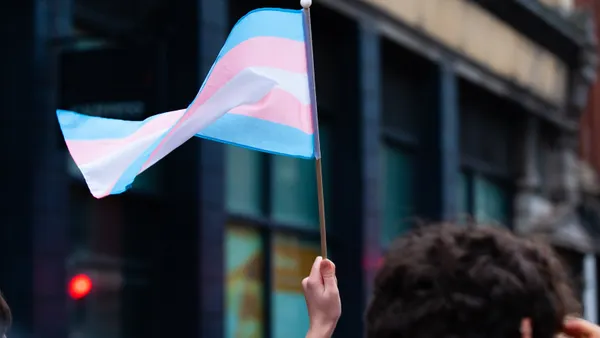Dive Brief:
- Virginia Gov.-elect Abigail Spanberger is calling on the University of Virginia's governing board to hold off on naming a new president or selecting finalists for the role until she takes office in January.
- Over the past six months, UVA's Board of Visitors has "severely undermined the public’s and the University community’s confidence" in its ability to act transparently and in the best interests of the state flagship, Spanberger said in a Wednesday letter to board leaders.
- Spanberger, a Democrat and an alumna of UVA, said five appointees to the board “failed to achieve confirmation” by the Virginia Assembly as law requires. That raises concerns about the legitimacy of any decisions made by the current board, as it isn’t “fully constituted,” she argued.
Dive Insight:
UVA's governing board has been in a state of flux since June. Outgoing Gov. Glenn Youngkin, a Republican, is in the midst of a fight with Virginia's Democrat-controlled Senate committee over his selections for several public college boards, including UVA.
The committee rejected eight of Youngkin’s appointments in June, but the governor instructed them to begin serving anyway. In July, a judge ruled that those eight board appointees for UVA, George Mason University and Virginia Military Institute could not serve on those boards. An appeal from outgoing Virginia Attorney General Jason Miyares is before the Virginia Supreme Court.
Democratic lawmakers similarly rejected another round of Youngkin appointees in August, bringing the total number of board seats under contention at Virginia public colleges to nearly two dozen.
At UVA, five appointees are in legal limbo.
Because of this, "the Board is not fully constituted and its composition is now in violation of statutory requirements in crucial respects, further calling into question the legitimacy of the Board and its actions," Spanberger said in her letter.
UVA's board currently has 12 voting members, well above the five it requires for a quorum. The university did not immediately respond to questions Thursday.
The governor-elect advised the board to pause its presidential search until it is "at full complement and in statutory compliance,” adding that would entail her appointing new members and the General Assembly approving them.
In turn, Spanberger pledged to make her appointments to the UVA board "quickly upon my swearing in."
UVA formed a special committee in July to select a new president following the abrupt departure of its former leader, Jim Ryan, less than a month earlier.
Ryan, who originally planned to leave the role at the end of the 2025-26 academic year, stepped down early amid reports of a pressure campaign orchestrated against him by the U.S. Department of Justice. The DOJ had been probing UVA's diversity, equity and inclusion efforts, which expanded following the deadly 2017 Unite the Right rally on the university’s campus and Ryan's inauguration as president a year later.
In his resignation announcement, Ryan said he wouldn’t challenge the Trump administration out of concern that attempting to keep his job would cost UVA research funding and student aid, as well as put international students at risk.
UVA said in November that in-person interviews for Ryan's replacement would take place late this month.
Spanberger in her letter Wednesday criticized Ryan's ouster as "a result of federal overreach" and noted that it went unchallenged by UVA's board members.
That lack of response, she argued, among other actions taken by the board over the last six months, has resulted in a "loss of confidence" in the governing body. She cited no confidence votes from both the UVA faculty senate and the university student council in July and August, respectively.
In October, UVA struck a deal with the DOJ to formally close the agency's investigations over its DEI work by 2028. In return, the university agreed to several changes, including adopting the DOJ's contentious anti-DEI guidance and making quarterly compliance reports.
Because the deal doesn’t include a financial penalty, it did not require a formal vote from the board, the university said in an FAQ.
Leaders of Virginia's Democratic-controlled Senate have called for a legal audit of the agreement, questioned its constitutionality and labeled it “a fundamental breach of the governance relationship” between the university and the state.
Last month, the Trump administration also offered the research university a separate deal — preferential access to federal research funding in exchange for enacting several wide-ranging and unprecedented conditions. UVA ultimately declined the compact, as did six other colleges to which the administration initially offered it.














